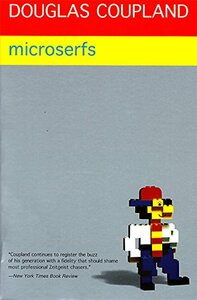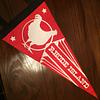You need to sign in or sign up before continuing.
Take a photo of a barcode or cover
funny
reflective
medium-paced
Plot or Character Driven:
Character
Strong character development:
Yes
Loveable characters:
Yes
No sé que estaba esperando de este libro, así que en realidad no sé que conclusiones sacar: si el objetivo era presentar una serie de entradas epístolares sin mucha cohesión entre ellos, es algo que se logra a la perfección (leyendo algo del contexto histórico del libro, aprendí que es el predecesor de los blogs modernos así que, a lo mejor, sí era ese el objetivo).
La falta de cohesión hace que los cambios de ritmo sean muy drásticos y que, muchas veces el uso del lenguaje se sienta forzado (como las metáforas comparando el mundo, físico y de las ideas, con algún aspecto de la computadora) pero en general no está tan mal.
Si alguien quiere un poco de contexto histórico, apreciará esta fotografía de lo que era la industria del software en Seattle y Silicon Valley a principio de los 1990's, nada más, no se fijen tanto en los viajes filosóficos de los personajes y no se imagen esto en forma de película indie con Zooey Deschanel como Karla...Dios sabe que yo lo hice.
La falta de cohesión hace que los cambios de ritmo sean muy drásticos y que, muchas veces el uso del lenguaje se sienta forzado (como las metáforas comparando el mundo, físico y de las ideas, con algún aspecto de la computadora) pero en general no está tan mal.
Si alguien quiere un poco de contexto histórico, apreciará esta fotografía de lo que era la industria del software en Seattle y Silicon Valley a principio de los 1990's, nada más, no se fijen tanto en los viajes filosóficos de los personajes y no se imagen esto en forma de película indie con Zooey Deschanel como Karla...Dios sabe que yo lo hice.
It's a strange time to read a book like this. When it came out it would have been very current regarding technology and computers and even other cultural details like the GAP. Now it's practically retro, almost like an old 80s movie. "How geeky we all were then." And yet it still has a futuristic, almost dystopic feel. Yet read this book in 20 or 30 or more years from now, and it will be an excellent historical fiction depicting this lifestyle in a profound way. It's a great commentary on consumerism, technology, social units...
Bound to be a classic.
Bound to be a classic.
It's not quite five stars, but there are enough good points it's more than 4.
What a weird ride! This covers so much of the tech and attitudes of geek culture in the early 90s, and ideas about the changing landscape of technology and society, it's fascinating.
This is the story of a particular coder working at Microsoft, and his journey into other areas, and exploring the difference between Seattle and Silicon Valley, and even Las Vegas. A big tech convention (CES) meets in Las Vegas. This is a much more realistic look at geeks and nerds of the time, and doesn't exploit them the way they do in Big Bang Theory, which makes sense, a book has a different kind of audience, and can tell a story more on its own terms than a TV show can.
I liked the way things unfolded, and there are some real moments that don't *quite* fit the story, but they feel like life, things happen, and you deal with them, the best you can.
What a weird ride! This covers so much of the tech and attitudes of geek culture in the early 90s, and ideas about the changing landscape of technology and society, it's fascinating.
This is the story of a particular coder working at Microsoft, and his journey into other areas, and exploring the difference between Seattle and Silicon Valley, and even Las Vegas. A big tech convention (CES) meets in Las Vegas. This is a much more realistic look at geeks and nerds of the time, and doesn't exploit them the way they do in Big Bang Theory, which makes sense, a book has a different kind of audience, and can tell a story more on its own terms than a TV show can.
I liked the way things unfolded, and there are some real moments that don't *quite* fit the story, but they feel like life, things happen, and you deal with them, the best you can.
Some parts of this, particularly the take on life at Microsoft, rang very true. i knew people just like this.
I dithered between a 3- or 4-star review, but I suppose since I am still reading this 20-odd years after it as published, suggests it isn't as 'of an age' as I once thought.
I haven't read it for years, possibly not in the last 15, since I became a microserf myself, although I never did really.
As I was reading it, it just kept occurring to me that change the names, the events, and the years, and it is basically now. Bill has become Steve, or Zuckerberg, or Ev, with corresponding company name changes. IBM is Microsoft, or Apple, or News Ltd. Oops, if Microserfs had been written twenty years later, would be some social application. The geek houses and the startup office would be exactly the same.
Plus ça change, plus c'est la même chose.
I haven't read it for years, possibly not in the last 15, since I became a microserf myself, although I never did really.
As I was reading it, it just kept occurring to me that change the names, the events, and the years, and it is basically now. Bill has become Steve, or Zuckerberg, or Ev, with corresponding company name changes. IBM is Microsoft, or Apple, or News Ltd. Oops, if Microserfs had been written twenty years later, would be some social application. The geek houses and the startup office would be exactly the same.
Plus ça change, plus c'est la même chose.
Well, 1995 me was a huuuge fan of this book and found it very moving and wise.
2014 me, on the other hand, finds it slightly embarrassing but still charming.
2014 me, on the other hand, finds it slightly embarrassing but still charming.
Reasons why I love both this book and Douglas Coupland:
1. "I sandpapered the roof of my mouth with three bowls of Cap'n Crunch--had raw gobbets of mouth-beef dangling onto my tongue all day." (Who hasn't had that happen to them? And yet, nobody could have said it awesomer.)
2. I learned 1410 *C = the melting point of silicon.
3. This book is totally the original Big Bang Theory.
4. Dated references to things like Doom and Myst.
5. I enjoy reading nerdy lists of things, like which school is the nerdiest (answer:Caltech ) or what cereal is the most decadent (answer: NOT Count Chocula, he's pro bringing down the ruling class ).
6. I enjoy reading references to places I've been, like the Westin Bayshore, because I know exactly what it looks like!
7. There's a two-page discussion of tampons and a reference to Summer's Eve (p. 286 for the curious).
And here's one more list for the road. If this book were featured on jeopardy its categories would be:
Nerdery
Apple vs. Microsoft
Books With No Conflict
Sappy but Cute Moments
Cliches and Stereotypes
Page Filler
Dated 90's Pop Culture
1. "I sandpapered the roof of my mouth with three bowls of Cap'n Crunch--had raw gobbets of mouth-beef dangling onto my tongue all day." (Who hasn't had that happen to them? And yet, nobody could have said it awesomer.)
2. I learned 1410 *C = the melting point of silicon.
3. This book is totally the original Big Bang Theory.
4. Dated references to things like Doom and Myst.
5. I enjoy reading nerdy lists of things, like which school is the nerdiest (answer:
6. I enjoy reading references to places I've been, like the Westin Bayshore, because I know exactly what it looks like!
7. There's a two-page discussion of tampons and a reference to Summer's Eve (p. 286 for the curious).
And here's one more list for the road. If this book were featured on jeopardy its categories would be:
Nerdery
Apple vs. Microsoft
Books With No Conflict
Sappy but Cute Moments
Cliches and Stereotypes
Page Filler
Dated 90's Pop Culture





